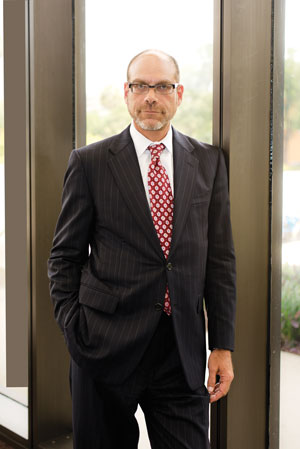Most recent sentence commutations include subject of ABA Journal story

James Ledford. Photo illustration by Wayne Slezak
When President Barack Obama commuted the sentences of 214 federal inmates earlier this month, the list included a name familiar to ABA Journal staff: James Ledford.
Ledford was the subject of “A Thousand Pardons,” the Journal’s July 2015 feature story on Clemency Project 2014, the massive pro bono effort to help federal prisoners apply for commutations. CP14, as project members call it for short, answered a call from the Obama Justice Department to help narrow down which prisoners qualify and put their best foot forward in applications.
In the early 2000s, Ledford says he was “a mixed-up, messed-up dude” and an addict who was selling just enough methamphetamine to stay high. He had Florida state convictions for drug possession and weapons when his wife was pulled over with him in the car—and more than a pound of meth in the trunk.
Ledford claimed the drugs to keep his wife out of trouble—but this time, the charge was federal. And at the time, federal prosecutors in central Florida were asking for sentence enhancements in every case that qualified. Ledford, with four drug priors, qualified for a life sentence (enhanced from roughly 22 years). The judge said there was no question that Ledford met the qualifications, though it gave him no pleasure to hand down the sentence.

Adam Allen, assistant federal public defender. ABA file photo by Alicia Katherine Johnson.
That could have been the end of the story if it hadn’t been for Obama’s decision to grant clemency to nonviolent drug offenders. But Ledford met all of the qualifications—he was serving a long sentence for a nonviolent drug crime, had no history of violence, had served at least ten years and had a record of good conduct in prison. Despite his life sentence, Ledford took advantage of opportunities in prison to kick his meth habit, get his GED, take vocational classes and work important jobs. Unusually for people sentenced to life in prison, Ledford’s good conduct got him moved from the maximum-security part of the Coleman federal correctional complex to a medium-security area.
“I suspect a lot of people would be like ‘I got life in prison—what freaking difference does it make?’ But he’s really taken advantage of every possible opportunity in prison to improve himself,” said Ledford’s former public defender, Adam Allen of the Middle District of Florida, in 2015.
When the clemency opportunity came along, Allen helped Ledford apply. They got further help from attorney Jim Felman, a CP14 volunteer and a partner at Kynes, Markman & Felman in Tampa, Florida. Felman, as a former co-chair of the ABA’s Criminal Justice Section, was part of the ABA’s leadership in CP14, a coalition of legal organizations that also includes Families Against Mandatory Minimums, a group of federal defenders, the National Association of Criminal Defense Lawyers and the American Civil Liberties Union.
“I’m extremely gratified that the president granted his commutation,” Felman told the ABA Journal on Monday. “He was extremely deserving, and it’s very gratifying to be able to help someone get the relief they deserve.”
Felman said Ledford’s clemency grant is one of 12 that his law firm has had a hand in so far, out of nearly 100 applications submitted. All are from the Coleman prisons complex; Felman said he went to the prison and offered his law firm’s help to every prisoner who didn’t have a lawyer.

Jim Felman. ABA file photo by Alicia Katherine Johnson.
In all, CP14 has submitted thousands of applications and had a hand in more than 200 commutations.
Ledford will be released in 2019 or perhaps slightly earlier if he can qualify for a residential drug and alcohol treatment program, Felman said. In 2015 interviews with the Journal, Ledford said he hoped, if released, to take over primary care of his teenage son who has Asperger’s syndrome who was raised by Ledford’s father. Ledford also planned not to return to his former home in Polk County, Florida, out of concerns about jeopardizing his sobriety.
In 2015, his family was considering a move to be near his brother in Alabama, and Ledford’s father was talking about the possibility of reopening the auto repair shop they ran together before Ledford went to prison.
Right after news of the clemency grant was announced, Ledford told the ABA Journal that he was a little in shock, but would like to relay his thanks to President Obama.
The Journal’s coverage of CP14 was recently recognized with a gold award from the American Society of Business Publication Editors.



